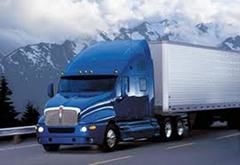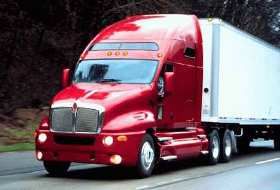Truck Driver Sentenced To Community Service......
Topic 11830 | Page 2

This article:
Truck Driver in Fatal Highway 17 Crash Sentenced to 3 Years Probation says:
"California Highway Patrol inspectors found the brakes on Singh's truck worn down to the metal, leaking and out of adjustment."
So I guess he was charged because he knew there was a problem but drove anyway.
Sarah D read through Pretrip. Do a search- Pretrip Daniel B.
Superb job done by Daniel with pictures
l have read it before and will do so again and again. So with a thorough pre-trip no truck should have aNY kind of breakdown, brakes included?
You can inspect with a fine tooth comb 10 times over before you hit the road but things can still break while driving. But like i was saying in my previous post a warning light should come on alerting you to a problem for a lot of things controlled by the computer.
some things will break, and give you no warning whatsoever, like a drive tire, or steering tire blowing. Have confidence in your ability to do a good pre trip, and things will work out 95% of the time. You just have to be prepared for the 5%
OWI:
Operating While Intoxicated

This article:
Truck Driver in Fatal Highway 17 Crash Sentenced to 3 Years Probation says:
"California Highway Patrol inspectors found the brakes on Singh's truck worn down to the metal, leaking and out of adjustment."
So I guess he was charged because he knew there was a problem but drove anyway.
I am surprised that punishment of Singh wasn't more severe- Singh's neglect- he should have seen the leak.
I guess that the point is that Singh did not kill the man, the cause was the unsafe brakes caused the accident, which then Singh was killed.
I don't have it in for truckers- I was trained at Prime, but I am not currently driving. I am just trying to understand.

As someone who literally just got through that section of safe driving on the High Road Training Program... it says that if you find something is broken or unsafe you need to get it repaired immediately... not asap... not after your load... immediately, as the next place your vehicle will be if you can't get someone to fix it where it is, is in the repair shop. It doesn't sound to me like he had that in his plans.
CDL:
Commercial Driver's License (CDL)
A CDL is required to drive any of the following vehicles:
- Any combination of vehicles with a gross combined weight rating (GCWR) of 26,001 or more pounds, providing the gross vehicle weight rating (GVWR) of the vehicle being towed is in excess of 10,000 pounds.
- Any single vehicle with a GVWR of 26,001 or more pounds, or any such vehicle towing another not in excess of 10,000 pounds.
- Any vehicle, regardless of size, designed to transport 16 or more persons, including the driver.
- Any vehicle required by federal regulations to be placarded while transporting hazardous materials.
SAP:
Substance Abuse Professional
The Substance Abuse Professional (SAP) is a person who evaluates employees who have violated a DOT drug and alcohol program regulation and makes recommendations concerning education, treatment, follow-up testing, and aftercare.
This article:
Truck Driver in Fatal Highway 17 Crash Sentenced to 3 Years Probation says:
"California Highway Patrol inspectors found the brakes on Singh's truck worn down to the metal, leaking and out of adjustment."
So I guess he was charged because he knew there was a problem but drove anyway.
Thanks, that sheds some more light on what happened. It's clearly his fault. He apparently knew the brakes were bad and drove anyway.
The driver's quote makes it sound like the company bullied him into driving what he knew was an unsafe truck, but it's always ultimately the driver's responsibility to make sure the truck is safe to drive. We don't know if the he did a thorough pretrip or not, and we don't know if he complained about the brakes before leaving. If it's documented and they didn't fix the brakes, then yeah, someone else is liable, but he still chose to drive the truck so he's the main culprit. Community service and probation seems like a pretty light sentence, especially if he drove knowing the brakes were bad.
What would have happened had he refused to take the truck and the load? Maybe the company would've fired him and found someone else to drive it, and maybe the accident would've still happened. Or maybe the company would've fixed the truck and there would have been no accident. Either way, Mr. Singh would not be the one who was facing sentencing.
Some things are not detectable during a pretrip. Last week I had a wheel hub break as I was driving down the highway. That wheel would have passed any pretrip that didn't involve disassembling it and looking for cracks in the hub behind the brake drum.
It's also interesting that the state that is requiring skirts on trailers is also making it harder to do a good pretrip. Especially on a flatbed with skirts, it takes quite a bit more effort to get under the truck and look at the trailer brakes when there are skirts on either side of the wheels, and to make sure there are no missing cross members. I'll sacrifice 1% fuel efficiency for ease of making sure the trailer is mechanically sound any day.
HOS:
Hours Of Service
HOS refers to the logbook hours of service regulations.OWI:
Operating While Intoxicated
"Don't take the keys," Singh said when asked what he would like to tell other drivers. "Don't get pushed around by anyone."
People come in here all the time saying things about the major trucking companies like "Oh, they're ok for a starter company" and I've said forever that you're sadly mistaken if you think the best in class companies in this nation are simply throwaways you use as training wheels and then discard. They're fantastic places to work regardless of your experience level.
But they're an especially nice place to work for a new driver because this kind of stuff will rarely happen. You will have some of the nicest equipment on the roads today and most of the time it's extremely well maintained.
But just as important is the attitude the large carriers take toward new drivers. It's extremely rare they would try to push a driver to do dangerous or illegal things. But the smaller mom-n-pop companies owned by old school truckers are far different in their approach. They often times will not hesitate to put you in an extremely dangerous position, trying to get you to risk your life and your career so they can use old, outdated, and poorly maintained equipment to save a buck.
Over the years I've worked for companies from 5 trucks to 5,000 and I can tell you I've had several small companies try to talk me into things I simply wouldn't do. Things like using extremely dangerous equipment to haul outlandishly overweight loads overnight when they knew the scales would be closed or it would be easy to go around them. To be honest, back then the trucking culture was more of a "Dukes of Hazzard" kind of thing where we all played 'good guys/bad guys' to get away with whatever we could. So ignoring the logbook was commonplace, but driving dangerous equipment was something you couldn't allow yourself to be talked into.
This driver is implying the company strong-armed him into driving that truck. Did they? I don't really care to be honest. He shouldn't have driven the truck and he knew it. It's entirely possible the company could have strong-armed him but you never risk lives to keep any job, haul any load, or please any boss. You have to recognize when you're in a position you need to walk away from.
So two warnings to new drivers:
1) Landing a local job right out of school is not the safest career path into trucking. We'll get people in here saying, "I know the usual path is to go OTR for the first year with a major carrier but I'd like to skip that and go local." It's totally understandable that some people are going to feel that way, especially if they have a family. But there's way more to this than simply driving around one area versus driving around the country. Doing local work is far more difficult and dangerous because you're in heavy traffic, in tight places, and on tight schedules all the time.
2) Working for a small company can mean a lot more than having a company with 10 trucks instead of 10,000. Today most small companies are still on paper logs and they do things the "Dukes Of Hazzard Way". They'll take advantage of every possibility to make an extra buck and that often means expecting their drivers to cheat their logbooks and drive unsafe equipment. They're often times run by old school truckers who spent their careers in a much different era in terms of both safety and following the laws.
It's entirely possible this story involves a driver who came out of school and quickly landed a job with a local company that did things the "Dukes Of Hazzard Way". He's new to the company and new to the industry and probably didn't want to ruffle feathers or lose money by requiring the truck to be safe before he drove it. You hope to learn rookie lessons the easy way and make small mistakes but trucking is so dangerous that it doesn't always happen that way. I always encourage people to take the safest, surest path to getting your career underway by working a full year OTR for a major carrier. You have the whole rest of your life to work wherever you like and get home on whatever schedule you like. But you have to survive that first year to get to that point in the first place and there's a lot more to learn about this industry than anyone would guess walking through the door for the first time.
Logbook:
A written or electronic record of a driver's duty status which must be maintained at all times. The driver records the amount of time spent driving, on-duty not driving, in the sleeper berth, or off duty. The enforcement of the Hours Of Service Rules (HOS) are based upon the entries put in a driver's logbook.
OTR:
Over The Road
OTR driving normally means you'll be hauling freight to various customers throughout your company's hauling region. It often entails being gone from home for two to three weeks at a time.
OWI:
Operating While Intoxicated

In a scenario with sudden lose of air pressure, the low pressure buzzer should give you time to hit the shoulder on your reserve air. If you aren't able to stop that way, then once the pressure drops low enough the brakes will engage mechanically to stop the truck. The reality of it could be that he wasn't paying attention, as drivers we see plenty of other "professional" drivers using their handheld phones, messing with radio, etc. As people have said if he was aware of a brake issue then he should have refused to drive and tried to secure photos of the issue so if his job was threatened then he would have evidence to support himself.

Thanks for all the answers. Some were very informative while others were ????
The following was on my mind when l asked the question.
"Some things are not detectable during a pretrip. Last week I had a wheel hub break as I was driving down the highway. That wheel would have passed any pretrip that didn't involve disassembling it and looking for cracks in the hub behind the brake drum."
OWI:
Operating While Intoxicated
New Reply:
New! Check out our help videos for a better understanding of our forum features

















Preview:
This topic has the following tags:
Driver Responsibilities Hard Lessons Learned Pre-trip inspection (PTI) Safe Driving Tips Truck Maintenance







 TT On Facebook
TT On Facebook
Serah, I think you are confusing yourself a little on this one. Just because you did a very thorough pre-trip doesn't mean nothing can go wrong. I watched four trucks, on a summer day two years ago, smoke their brakes (burn their brakes up so that they had no more stopping power) going down mountains in Southern California. That doesn't mean they did not do a proper pre-trip. But it did show that they did not know how to make a proper descent of a steep grade in that Southern California heat. Something went wrong for this guy, but to be honest with you no one really knows just yet what exactly happened. I just don't want you to confuse the pre-trip for a magical cure that will eliminate anything going wrong.